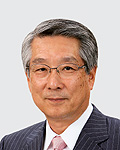Messages from Keidanren Executives and Contributed articles to Keidanren Journals July, 2012 Going for the Gold

This year's Summer Olympic Games will begin in London later this month (July 27 to August 12). This quadrennial event brings together top athletes from around the globe to pit their abilities against each other in the world's biggest festival of sports.
The first modern Olympics were held in 1896, and this year's games are the thirtieth. The number of participating countries, which was just 14 at the first Olympiad, set a new record of 204 at the most recent Olympics in Beijing. The Olympic games have developed into a truly global event.
The original purpose of the Olympics is to contribute to peace and a better world through sports, but for the participants the games are also an important opportunity to display their own abilities. Japan first participated in the Olympic Games held in Stockholm in 1912, exactly 100 years ago. Our country was represented by just two athletes, who took part in sprints and the marathon. They were overwhelmed by the high level of global competition, but what they brought back from Stockholm-including the idea of spiked running shoes and the crouching start-contributed to the enhancement of Japan's athletics know-how. Over the century since then, Japanese athletes have won a total of 123 Olympic gold medals. Their successes are surely the outcome of great efforts: As Olympic competitors they have personally sensed how they compare to their rivals at the global level, and based on this awareness, they must have striven to overcome their weaknesses and further polish their strengths so as to achieve global caliber.
That brings me to the TPP, or Trans-Pacific Partnership. One cannot say that participating in this broad agreement on free trade and investment is directly comparable to taking part in the Olympics, which is a rewarding experience by itself even for those who do not win medals. But it seems to me that not participating in the TPP is no longer a realistic option for Japan.
When I visited Vietnam recently as part of a Keidanren mission, senior government officials whom we met said one after another that they welcomed Japan's decision to seek a place at the TPP negotiating table. Our two countries are undertaking a Vietnam-Japan Joint Initiative aimed at improving the environment for business and investment in Vietnam; we should note that the Vietnamese government organs cooperating in this endeavor are motivated by the lofty vision of enhancing Vietnam's competitive strength and thereby contributing to its development over the long term.
Innovation is the wellspring of economic growth. We need to maintain a forward-looking mind-set toward the TPP, seeing it as a framework that will promote the links between Japan and the rest of the world and open the way to competition, leading to the adoption of new know-how and ideas, which will allow us to realize our latent strengths. Furthermore, Japan has many high-quality goods, including agricultural products, that have great export potential, which the TPP will make it easier to realize.
Instead of looking only at the short-term effects of participation in the TPP, we should take this as an opportunity for efforts in each field to overcome weaknesses and polish strengths so as to achieve global caliber. In other words, we should be going for the gold!

